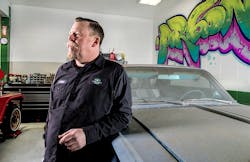ARGONAUT GARAGE Location: Berkeley, Calif. Size: 4,000 square feet Staff Size: 5 Average monthly car count: 120 Annual revenue: $720,000
The San Francisco Bay Area is notorious for its microclimates. In fact, the area features several varieties of climates within just a few miles of each other.
Jason Simms knows, all too well, how things can turn from hot to cold in a hurry in that region.
Less than a year ago, conditions seemed favorable at Simms’ original auto shop, Kensington Service Station, a tiny, three-bay facility in the affluent, unincorporated community of Kensington, Calif., located in the Berkeley Hills. Slowly but surely, that business had garnered a loyal customer base, which led to consistent, three-week waits for scheduled work.
Simms’ business eventually outgrew its cramped, 1,000-square-foot confines, which, in the summer of 2016, prompted him to open a second location just a few miles away in Berkeley. Both facilities would bare the name of Argonaut Garage.
After three months, though, Simms’ right-hand employee decided to make a career change. And, a new owner of the original facility’s real estate had designs on rebranding the service space as a mini-mart, meaning Simms’ future leases would potentially be short-term.
That left Simms feeling uneasy. Before long, he made a decisive choice and gave his longtime customers a three-week notice: Simms was going all in with his Berkeley location and closing the original shop.
Simms says the transition “to just an auto repair facility down on the main street, where there’s five auto repair shops on either side, is a different animal completely.”
In fact, less than a year later, the owner acknowledges the business climate wasn’t ripe for his expansion; with the benefit of hindsight, he expanded his business too soon. While the middle stages of 2016 featured some inclement moments, Simms remained determined to make his Berkeley location prosperous.
KEYS FOR A POSITIVE WEBSITE PRESENCE
Jason Simms, owner of Argonaut Garage in Berkeley, Calif., breaks down the keys to a shop website that grabs customers’ attention.
A great shop website shouldn’t conform to everybody else’s standards. If you use certain companies, they have a very formulaic recipe for what their websites look like, and I don’t think that sets you apart—there’s nothing there that tells you about an individual shop, you know? There are reviews, but everybody has reviews. It needs to be different than other people’s websites. I want the website to be fun—I want people to know that we’re enjoying what we’re doing.
THE BACKSTORY
For the better part of five years, Simms’ work days had been almost serene. The shop owner, his business and the tranquil Kensington neighborhood worked well together.
“Think Mayberry,” Simms says. “My shop became this go-to for everything. It was this really great situation.”
Of course, in 2016, buoyed by that solid community connection, Simms tempted fate and opened his second facility barely three miles away. The thought process was that the new location could handle larger repairs than the original, cramped facility could. That two-shop experiment barely lasted 90 days before the shuttering of the original shop.
“Not what I planned, for sure,” Simms says. “The whole process has just been crazy.”
Moving on after a shop closure can be tough—agonizing, even, especially when a shop operator and his or her community have formed a bond. But Simms was humble enough to learn from his mistakes.
THE PROBLEM
At Simms’ original shop in the Kensington neighborhood, he had a trusted, second-in-command employee, who had worked at his side for five years. When she decided to make a career change, it provided the final impetus for Simms to close that facility.
“Because of the nature of what it was—a small, neighborhood shop—I couldn’t just grab somebody off the street and stick them in there. I think it would’ve failed,” Simms says of his first location. “So, we decided to shutter that location and move everything down the hill to the second location.”
Simms had always been steadfast in his belief that he wanted employees to do work they’re passionate about, while making a legitimate profit. In late 2016, he still felt that way, though transitioning strictly to the Berkeley location required adapting to a fairly different customer base than what his original shop yielded.
“Now we have very few drive-in customers,” he says. “We’re relying on my former customers to come down the hill. And so the marketing side of what it takes to run just a stand-alone shop—where I don’t just have people driving in my door all day—is definitely something new.”
THE SOLUTION
One of the first marketing techniques Simms utilized for his Berkeley facility was a direct mail advertising campaign. And the research that accompanies such a marketing effort provided a valuable revelation: Nearly 16,000 people within a five-mile radius of the new Argonaut location owned hybrids.
Suddenly, the clouds started to part, as Simms had a definitive target demographic for his marketing. As he shifted his business model, Simms made sure his staff took several training classes dedicated to hybrids, and he purchased special equipment devoted to that vehicle segment, like dedicated factory scanners for Toyotas and Hondas, and a new high voltage insulation tester.
Another key element of Argonaut’s rejuvenation came from its revamped website (argonautgarage.com). Simms spent roughly $1,500 to have AutoVitals build a visually appealing, SEO-friendly website to build out its online presence.
“Through AutoVitals there are 40 search parameters,” Simms notes, “and [with] those 40 SEO points we targeted everything that had to do with hybrids.”
Argonaut Garage’s unique octopus logo certainly doesn’t hurt its marketing efforts, either.
“Berkeley is a pretty smart city, so I wanted a name that was a little cerebral,” Simms says. “We also wanted to reflect in our logo the classic side of what we’re doing, the history of auto repair. … If you Google what an argonaut is, the first result is an octopus. So we took that octopus and ran with the idea.”
THE AFTERMATH
Argonaut’s Berkeley location generates nearly $60,000 in monthly revenue, leaving annual projections for the young facility at $720,000. Simms says his original shop in the Kensington neighborhood brought in $650,000 in gross annual revenue.
At his original location, Simms—who’s confident that marketing targeted largely toward hybrids will increase profitability—was paying $4,500 per month in rent. He currently pays $6,090 in rent, but his old facility cost $4.50 per square foot and his new Berkeley location costs around $1.50.
Argonaut’s remaining facility also boasts an average monthly car count of 120.
The disappointment Simms felt after his original shop was shuttered has started to dissipate as a result of his business’s upward trend.
THE TAKEAWAY
When Simms speaks of his original shop’s setting, he describes an idyllic scenario seemingly torn from “The Andy Griffith Show.” Yet, he’s starting to realize that his future in Berkeley could be just as untroubled in time—and more profitable, too.
In retrospect, Simms simply would’ve weighed his options longer before opening that second facility.
“Ultimately, it was this fantasy that I had about having two locations, and being able to provide service to a bigger range of customers,” Simms acknowledges. “[I’m] disappointed in myself that we couldn’t make those shops both work at the same time.
“There was probably some self-reflection that should’ve happened, thinking back to when I first opened the [Berkeley] shop.”
Nowadays, a clear marketing focus has the shop operator feeling like the turbulence of his recent past is behind him. After all, a fair amount of Kensington Service Station’s database of 900 customers has started to make the trek 3 miles down the hill to Berkeley’s Argonaut Garage.
“What gives me confidence,” Simms says, “is that I know we are more dedicated to our customers than most other places.”
Expert Advice: Surviving Your First Year Owning a Shop
Dave Markert, owner of Markert Motor Works in Lawrenceville, Ga., has grown his shop from a modest start in 2011 to one that brought in $1.6 million in total revenue in 2016. Markert provides his tips for surviving the initial 12 months as a shop owner.
Plan, plan, plan. Before you make a decision to buy a shop, or own a shop, plan out logistics. Plan out the first six months of finances. I graduated from college in August 2011 with an engineering degree. I had literally no idea what I was doing, like with taxes—it was the school of hard knocks. But we haven’t borrowed a dime. So it was easier to handle the terrible, or slow months. And be extremely financially mindful of everything you’re doing in the beginning.
Address problems on a global basis, otherwise you’ll end up drowning. At the start I was trying to take care of everything that was in front of me on a daily basis. You’re trying to put out fires every day. And there’s going to be angry customers. But wake up every day expecting that. Then, when it does happen, you’re not surprised. Maintain that calm. Everyone’s emotional early on, and when you fire back at them with that same level of insanity, things get out of control. Take every day as it comes. When you have a bad day, don’t let it get the best of you. Removing emotion is the biggest thing. Don’t allow your emotions to play with your business practices. A business owner is calm, collected, chill. That’s what has allowed me to keep my sanity.

